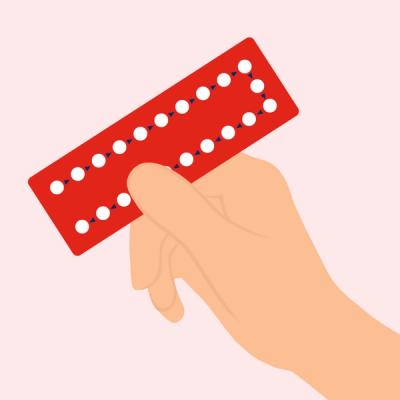Lo Jaimiess Birth Control Pills FAQ
-
Oral contraceptives (birth control pills), like LoJaimiess, are used to prevent pregnancy. Estrogen and progestin are two female sex hormones. Combinations of estrogen and progestin work by preventing ovulation (the release of eggs from the ovaries). They also change the lining of the uterus (womb) to prevent pregnancy from developing and change the mucus at the cervix (opening of the uterus) to prevent sperm (male reproductive cells) from entering. Oral contraceptives are a very effective method of birth control, but they do not prevent the spread of human immunodeficiency virus (HIV, the virus that causes acquired immunodeficiency syndrome [AIDS]) and other sexually transmitted diseases.
Some brands of oral contraceptives are also used to treat acne in certain patients. Oral contraceptives treat acne by decreasing the amounts of certain natural substances that can cause acne.
Some oral contraceptives (Beyaz, Yaz) are also used to relieve the symptoms of premenstrual dysphoric disorder (physical and emotional symptoms that occur before the menstrual period each month) in women who have chosen to use an oral contraceptive to prevent pregnancy.
-
Oral contraceptives, like LoJaimiess, come in packets of 21, 28 or 91 tablets to take by mouth once a day, every day or almost every day of a regular cycle. To avoid nausea, take oral contraceptives with food or milk. Take your oral contraceptive at the same time every day. Take your oral contraceptive exactly as directed. Do not take more or less of it, take it more often or take it for a longer time than prescribed by your doctor.
Oral contraceptives come in many different brands. Different brands of oral contraceptives contain slightly different medications or doses, are taken in slightly different ways, and have different risks and benefits. Be sure you know which brand of oral contraceptives you are using and exactly how you should use it. Ask your doctor or pharmacist for a copy of the manufacturer's information for the patient and read it carefully.
If you have a 21-tablet packet, take one tablet daily for 21 days and then don’t take any for seven days. Then start a new packet.
If you have a 28-tablet packet, take one tablet daily for 28 days in a row in the order specified in your packet. Start a new packet the day after you take your 28th tablet. The tablets in most 28-tablet packets may have different colors. Many 28-tablet packets have certain color tablets that contain different amounts of estrogen and progestin, but also may have other color tablets, which contain an inactive ingredient or a folate supplement.
If you have a 91-day tablet packet, take one tablet daily for 91 days. Your packet will contain three trays of tablets. Start with the first tablet in the first tray and continue taking one tablet every day in the order specified on the packet until you have taken all the tablets in all the trays. The last set of tablets are a different color. These tablets may contain an inactive ingredient, or they may contain a very low dose of estrogen. Start your new packet the day after you take your 91st tablet.
Your doctor will tell you when you should start taking your oral contraceptive. Oral contraceptives are usually started on the first or fifth day of your menstrual period, or on the first Sunday after or on the day bleeding begins. Your doctor will also tell you whether you need to use another method of birth control during the first seven to nine days that you take your oral contraceptive and will help you choose a method. Follow these directions carefully.
You will probably experience withdrawal bleeding similar to a menstrual period while you are taking the inactive tablets, the low dose estrogen tablets or during the week that you do not take your oral contraceptive. If you have the type of packet that only contains active tablets, you will not experience any scheduled bleeding, but you may experience unexpected bleeding and spotting, especially at the beginning of your treatment. Be sure to start taking the tablets in your new packet on schedule even if you are still bleeding.
You may need to use a backup method of birth control if you vomit or have diarrhea while you are taking an oral contraceptive. Talk to your doctor about this before you begin to take your oral contraceptive so you can prepare a backup method of birth control in case it is needed. If you vomit or have diarrhea while you are taking an oral contraceptive, call your doctor to find out how long you should use a backup method.
If you have recently given birth, wait until four weeks after delivery to begin taking oral contraceptives. If you have had an abortion or miscarriage, talk to your doctor about when you should begin taking oral contraceptives.
Oral contraceptives will work only as long as they are taken regularly. Continue to take oral contraceptives every day even if you are spotting or bleeding, have an upset stomach or do not think that you are likely to become pregnant. Do not stop taking oral contraceptives without talking to your doctor.
-
If it is your first time using LoJaimiess birth control pill, use an additional form of nonhormonal birth control (condoms, spermicide, etc.) for the first seven days to prevent pregnancy until the medication has enough time to work. If your first dose lands on the first day of your period, you do not need to use backup birth control.1
-
LoJaimiess birth control pill is available via prescription only. It is not available over the counter.
-
With RedBox Rx, you can get a prescription for LoJaimiess for as low as $10 per month without insurance.
-
Before taking LoJaimiess:
Tell your doctor and pharmacist if you are allergic to estrogen, progestin or any other medications.
Tell your doctor and pharmacist what prescription and nonprescription medications, vitamins and nutritional supplements you are taking. Be sure to mention any of the following: acetaminophen (APAP, Tylenol); antibiotics such as ampicillin (Principen), clarithromycin (Biaxin), erythromycin (E.E.S., E-Mycin, Erythrocin), isoniazid (INH, Nydrazid), metronidazole (Flagyl), minocycline (DYNACIN, Minocin), rifabutin (Mycobutin), rifampin (Rifadin, Rimactane), tetracycline (Sumycin) or troleandomycin (Tao) (not available in the U.S.); anticoagulants (blood thinners) such as warfarin (Coumadin); antifungals such as griseofulvin (Fulvicin, Grifulvin, Grisactin), fluconazole (Diflucan), itraconazole (Sporanox) or ketoconazole (Nizoral); atorvastatin (LIPITOR); clofibrate (Atromid-S); cyclosporine (Neoral, Sandimmune); bosentan (TRACLEER); cimetidine (Tagamet); danazol (Danocrine); delavirdine (Rescriptor); diltiazem (Cardizem, Dilacor, Tiazac); fluoxetine (Prozac, Sarafem, in Symbyax); HIV protease inhibitors such as indinavir (Crixivan) or ritonavir (Norvir); medications for seizures such as carbamazepine (Tegretol), felbamate (Felbatol), lamotrigine (Lamictal), oxcarbazepine (Trileptal), phenobarbital (Luminal, Solfoton), phenytoin (Dilantin), primidone (Mysoline), or topiramate (Topamax); modafinil (Provigil); morphine (Kadian, MS Contin, MSIR, others); nefazodone; rifampin (Rimactane, Rifadin, in Rifater); oral steroids such as dexamethasone (Decadron, Dexone), methylprednisolone (Medrol), prednisone (Deltasone) or prednisolone (Prelone); temazepam (Restoril); theophylline (Theobid, Theo-Dur); thyroid medication such as levothyroxine (Levothroid, LEVOXYL, Synthroid); verapamil (Calan, COVERA-HA, Isoptin, Verelan); vitamin C; or zafirlukast (Accolate). Your doctor may need to change the doses of your medications or monitor you carefully for side effects.
If you are taking oral contraceptives that contain drosperinone (Beyaz, Gianvi, Loryna, Ocella, Safyral, Syeda, Yasmin, Yaz or Zarah) tell your doctor and pharmacist if you are taking any of the medications listed above or any of the following: angiotensin-converting enzyme (ACE) inhibitors such as benazepril (Lotensin), enalapril (Vasotec), or lisinopril (Prinivil, Zestril); angiotensin II antagonists such as irbesartan (Avapro), losartan (Cozaar) or valsartan (Diovan); aspirin or other nonsteroidal anti-inflammatory drugs (NSAIDs) such as ibuprofen (Advil, Motrin) or naproxen (Aleve, Naprosyn); diuretics (water pills) such as amiloride (Midamor), spironolactone (Aldactone), or triamterene (Dyrenium); eplerenone (Inspra); heparin; or potassium supplements. Before taking Beyaz or Safyral, also tell your doctor or pharmacist if you are taking cholestyramine (Locholest, Prevalite, Questran), a folate supplement, methotrexate (Trexall), pyrimethamine (Daraprim), sulfasalazine (Azulfidine) or valproic acid (Depakene, Stavzor).
Tell your doctor what herbal products you are taking, especially St. John's wort.
Tell your doctor if you have or have ever had blood clots in your legs, lungs or eyes; thrombophilia (condition in which the blood clots easily); coronary artery disease (clogged blood vessels leading to the heart); cerebrovascular disease (clogging or weakening of the blood vessels within the brain or leading to the brain); stroke or mini-stroke; an irregular heartbeat; heart disease; a heart attack; chest pain; diabetes that has affected your circulation; headaches that come along with other symptoms such as vision changes, weakness or dizziness; high blood pressure; breast cancer; cancer of the lining of the uterus, cervix or vagina; liver cancer, liver tumors or other types of liver disease; yellowing of the skin or eyes during pregnancy or while you were using hormonal contraceptives (birth control pills, patches, rings, implants or injections); unexplained abnormal vaginal bleeding; adrenal insufficiency (condition in which the body does not produce enough of certain natural substances needed for important functions such as blood pressure); or kidney disease. Also tell your doctor if you have recently had surgery or have been unable to move around for any reason. Your doctor may tell you that you should not take certain types of oral contraceptives, or that you should not take any type of oral contraceptive if you have or have had any of these conditions.
Also tell your doctor if anyone in your family has had breast cancer, if you are overweight or if you have or have ever had problems with your breasts such as lumps, an abnormal mammogram (breast X-ray) or fibrocystic breast disease (swollen, tender breasts and/or breast lumps that are not cancer); high blood cholesterol or fats; diabetes; asthma; toxemia (high blood pressure during pregnancy); heart attack; chest pain; seizures; migraine headaches; depression; gallbladder disease; jaundice (yellowing of the skin or eyes), or excessive weight gain and fluid retention (bloating) during the menstrual cycle.
Do not take oral contraceptives if you are pregnant, plan to become pregnant or are breastfeeding. If you become pregnant while taking oral contraceptives, call your doctor immediately.
If you miss periods while you are taking oral contraceptives, you may be pregnant. If you are using a 91-tablet packet and you miss one period, call your doctor. If you are using another type of packet according to the directions and you miss one period, you may continue to take your tablets. However, if you have not taken your tablets as directed and you miss one period or if you have taken your tablets as directed and you miss two periods, call your doctor, and use another method of birth control until you have a pregnancy test. If you are using a 28-tablet packet that contains only active tablets, you will not expect to have periods on a regular basis, so it may be hard to tell if you are pregnant. If you are using this type of oral contraceptive, call your doctor and have a pregnancy test if you experience symptoms of pregnancy such as nausea, vomiting or breast tenderness, or if you suspect you might be pregnant.
If you are having surgery, including dental surgery, tell the doctor or dentist that you are taking oral contraceptives.
You should know that oral contraceptives may cause a spotty darkening of the skin, especially on the face. If you have experienced changes in your skin color during pregnancy or while you were taking oral contraceptives in the past, you should avoid exposure to real or artificial sunlight while you are taking oral contraceptives. Wear protective clothing, sunglasses and sunscreen.
Tell your doctor and pharmacist if you wear contact lenses. If you notice changes in vision or ability to wear your lenses while taking oral contraceptives, see an eye doctor.
-
Unless your doctor tells you otherwise, continue your normal diet while taking LoJaimiess.
-
If you miss a dose of LoJaimiess, you may not be protected from pregnancy. You may need to use a backup method of birth control for seven to nine days or until the end of the cycle. Carefully read the directions in the manufacturer's information for the patient that came with your oral contraceptive. If you have any questions, call your doctor or pharmacist. Continue to take your tablets as scheduled and use a backup method of birth control until your questions are answered.
-
If you stop taking LoJaimiess, you will no longer be protected against pregnancy. You may also experience breakthrough bleeding, changes in your period or have a delay in getting your period.2
-
Side effects of LoJaimiess include:
Nausea.
Vomiting.
Stomach cramps or bloating.
Diarrhea.
Constipation.
Gingivitis (swelling of the gum tissue).
Increased or decreased appetite.
Weight gain or weight loss.
Brown or black skin patches.
Acne.
Hair growth in unusual places.
Bleeding or spotting between menstrual periods.
Changes in menstrual flow.
Painful or missed periods.
Breast tenderness, enlargement or discharge.
Swelling, redness, irritation, burning or itching of the vagina.
White vaginal discharge.
Please contact your doctor if any symptoms are severe or do not go away.
-
Keep this medication in the packet it came in, tightly closed, and out of reach of children. Store it at room temperature and away from excess heat and moisture (not in the bathroom).
Unneeded medications should be disposed of in special ways to ensure that pets, children and other people cannot consume them. However, you should not flush this medication down the toilet. Instead, the best way to dispose of your medication is through a medicine take-back program. Talk to your pharmacist or contact your local garbage/recycling department to learn about take-back programs in your community.
-
In case of overdose, call the poison control helpline at 1-800-222-1222. Information is also available online at https://www.poisonhelp.org/help. If the victim has collapsed, had a seizure, has trouble breathing or can't be awakened, immediately call emergency services at 911.
Symptoms of overdose may include:
Nausea.
Vaginal bleeding.
-
Keep all appointments with your doctor and the laboratory. You should have a complete physical examination every year, including blood pressure measurements, breast and pelvic exams, and a Pap test. Follow your doctor's directions for examining your breasts; report any lumps immediately.
Before you have any laboratory tests, tell the laboratory personnel that you take oral contraceptives.
If you wish to stop taking oral contraceptives and become pregnant, your doctor may tell you to use another method of birth control until you begin to menstruate regularly again. It may take a long time for you to become pregnant after you stop taking oral contraceptives, especially if you have never had a baby or if you had irregular, infrequent or complete absence of menstrual periods before taking oral contraceptives. However, it is possible to become pregnant within days of stopping certain oral contraceptives. If you want to stop taking oral contraceptives but do not want to become pregnant, you should begin using another type of birth control as soon as you stop taking oral contraceptives. Discuss any questions that you may have with your doctor.
Oral contraceptives may decrease the amount of folate in your body. Folate is important for the development of a healthy baby, so you should talk to your doctor if you want to become pregnant soon after you stop taking oral contraceptives. Your doctor may recommend that you take a folate supplement or an oral contraceptive that contains a folate supplement (Beyaz, Safyral).
Do not let anyone else take your medication. Ask your pharmacist any questions you have about refilling your prescription.
It is important for you to keep a written list of all of the prescription and nonprescription medicines you are taking, as well as any products such as vitamins, minerals or other dietary supplements. You should bring this list with you each time you visit a doctor or if you are admitted to a hospital. It is also important information to carry with you in case of emergencies.
-
The brand name for LoJaimiess is Lo-Seasonique®.
-
If LoJaimiess is unavailable, another generic equivalent like levonorgestrel/ethinyl estradiol may be prescribed. This generic contains the same active ingredients as LoJaimiess and offers the same effectiveness.
-
We offer a variety of prescription medication options for birth control including:
Volnea (Generic Mircette®)
Levonorgestrel-Ethinyl Estradiol (Generic Seasonale®)
Xulane® topical patch
-
Cigarette smoking increases the risk of serious side effects from oral contraceptives, including heart attacks, blood clots and strokes. This risk is higher for women over 35 years of age and heavy smokers (15 or more cigarettes per day). If you take oral contraceptives, you should not smoke.
-
View our telehealth and online pharmacy FAQs here.





